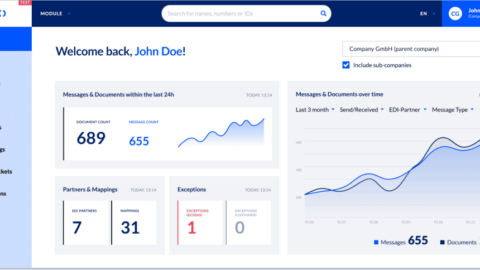Over the past few years the Covid 19 pandemic had a significant impact on the global economy. In particular, as transportation of goods became more difficult and demand increasingly unpredictable, the resilience of supply chains became drastically more important.
Christoph Ebm, Managing Director at ecosio, shared his thoughts on this topic in a recent interview (detailed in full below). In it, he expands on the value of electronic data exchange in strengthening supply chains and how efficient B2B integration can help companies to bounce back post-Covid.
Christoph Ebm is one of ecosio’s three Managing Directors. He is primarily responsible for all commercial matters. In addition to sales and strategy, he takes care of legal agendas, finance and controlling.
Covid-19 has changed the world of work. Where does EDI fit in this new landscape?
With advancing digitalisation on the one hand and a growing number of legal e-invoicing requirements on the other, EDI has never been so crucial to supply chain success. Many companies are now looking to outsource EDI issues, as more and more CIOs are realising that compared to internal IT departments, a professional service provider like ecosio can deliver B2B automation that is both more reliable and cost-effective. As a result, the EDI market is undergoing a major transformation and is gaining enormously in importance.
Since Covid-19, resilient supply chains have become more important. Where are the challenges?
Since the Covid 19 pandemic many executives are concerned about supply chain continuity – the uninterrupted flow of materials and components in supply chains, from raw material to customer. There are many little things that can break supply chains, and it’s important for companies to know which areas of their supply chain are reliable and which need work.
As EDI is a central cog in modern supply chains, it is extremely important that this is one element companies can always rely on. Ultimately, a supply chain is only as strong as its weakest link… and that weak link should not be EDI.
What questions regarding EDI should CIOs be asking?
Let’s make a comparison: as an end consumer, I don’t want or need to know how my mobile phone service provider connects me to the person I’m calling, wherever they are in the world. I don’t want to have to worry about that. The same is true for EDI. As the CIO or IT department of a company, I also don’t want to have to think about EDI – yet my EDI should of course be automated, cost-effective and low-maintenance. So the key question for CIOs is: what do I have to do so that we can benefit from successful, reliable EDI with minimum hassle?
The answer is simple: full outsourcing! Via the cloud it’s now possible to hand over all EDI issues to an experienced, reliable provider. This also includes non-technical tasks, such as chasing partners for information during onboardings. Generally, communication and project management are areas where providers can really add value.
Is the perception of EDI changing?
What people understand by the term EDI can vary greatly. For those who have been doing EDI for years, their perception of EDI may be outdated. Protocols such as X.400, OFTP1 or fixed-length file exchange have a long legacy in EDI – and they represent a poor image of it.
With modern EDI things have evolved. Today, we use modern protocols such as AS2 or OFTP2 and exchange data via APIs. New technologies are constantly being developed, and legal requirements and standards are changing all the time. At ecosio, we use the term EDI synonymously for the entire field of automated B2B communication, across company boundaries, from ERP system to ERP system, without human interaction.
For companies, these developments mean a constantly growing and more complex EDI market. A good example is the different legislation and requirements in individual countries regarding e-invoices. These differences increase the complexity of modern EDI solutions and can be very complicated to handle in-house. Likewise, the number of market participants is also growing continuously, which means that EDI landscapes will become even more complex in the coming years.
But there is hope for companies that don’t want to expose themselves to this development. They can reduce the complexity that EDI brings with it today by handing over their EDI efforts to a reliable partner. This EDI provider should be reliable, deal with EDI on a daily basis and operate EDI as their core business (as we at ecosio have been doing with passion for over 10 years). This is the best way to achieve efficient, future-proof and cost-effective electronic data exchange. With such an approach, CIOs no longer have to worry about the growing complexity of EDI. Instead, they can concentrate on their core business again.
What is the significance of the cloud when it comes to EDI?
Cloud-based solutions form the basis for companies to be able to outsource EDI. The only real alternative to a cloud-based approach is an on-premise approach, in which IT departments have to run the software in-house. These IT departments always start with the initial software installation. Importantly, new installations mean that there are no databases available for these IT departments to build on. Instead, they have to rebuild connections, create new mappings and find the right contacts. That means a lot of work!
In a well-implemented cloud approach companies benefit from pre-existing data assets. This makes things much less complex and more cost- and time-efficient, resulting in faster time-to-value.
Perhaps most importantly of all, well-made EDI infrastructure via the cloud is also many times more resilient than in-house EDI solutions. Why? Because no company operates a multi-redundant IT infrastructure as an individual customer. This is different for service providers like ecosio. As we’re responsible for the smooth automated B2B communication of our more than 400 customers, our infrastructure has six-fold redundancy.
Where does ecosio fit in the future of EDI?
We have just renewed our product vision: “Building the leading global network for automated B2B communication”. This now accurately reflects our desire to continue to grow. Over the next few years we are aiming to internationalise further and become the market leader for B2B integration. Hopefully we can help more and more companies recognise that, when managed by experts, EDI can both effective and effortless!












